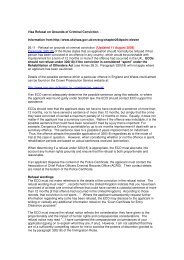ACO NEWSLETTER - Ecb - England and Wales Cricket Board
ACO NEWSLETTER - Ecb - England and Wales Cricket Board
ACO NEWSLETTER - Ecb - England and Wales Cricket Board
Create successful ePaper yourself
Turn your PDF publications into a flip-book with our unique Google optimized e-Paper software.
have now. From the beginnings of internationalcricket the accidental breaking of thewicket has occurred from time to time withno action being taken. This clearly qualifiesas long term precedent <strong>and</strong> should notbe changed under match pressure.2. Progressively, match management aspectshave been removed from the players. Agood example is the way we now h<strong>and</strong>leweather conditions. There is no longer anyinput from the players as the decisions restsolely with the umpire. This principle is agood one because players will, quite naturally,seek to influence decisions to theirbenefit which are not necessarily to thebenefit of the game or to any concept offairness. The incident that sparked the controversyseems to have been directly influencedby Graeme Smith suggesting toSteve Davis an element of distractionwhich he then cashed in, perhaps to hissurprise <strong>and</strong> delight, when caught at slip.Steve Davis got it wrong by allowing theplayer to ‘groom’ him into making a decisionthat has probably never been made before.These are two very simple principles, (a)don’t change long term precedent without dueconsideration <strong>and</strong> (b) don’t allow players toinfluence decisions.Whether or not one thinks that this accidentaldislodgement of the non-striker’s wicketcould be a distraction is quite irrelevant. Ithasn’t been considered so in the thous<strong>and</strong>s ofgames played before <strong>and</strong> as such should notbe considered so now without some thought.If only we could approach the other bizarreinconsistencies in ICC ‘rules’ <strong>and</strong> the laws ofcricket the game might be a little easier forpeople to underst<strong>and</strong>.Philip Willsher of Norfolk wrote in regardinga superb bit of fielding in <strong>Engl<strong>and</strong></strong>’sSuper 8 game against West Indies:I agree that it is rare to see such natural <strong>and</strong>amazing talent exhibited in the field at anylevel of the game but I have a technical pointto raise as it may one day come up when I amst<strong>and</strong>ing.The player who made the fantastic save of asix hit was st<strong>and</strong>ing with one foot touchingthe boundary when he took off, therefore outof the field of play. At no other time did hetouch the ground throughout his fielding ofthe ball <strong>and</strong> the award of six runs was denied.My point is this, when I was a rugby refereethe Laws for this game stated that to keep aball within the playing area one had to startsuch an attempt from wholly within the playingarea or the ball when touched would beconsidered to be in touch. Does this apply tocricket also? Because if so it would have significantlyaltered the way in which the <strong>Engl<strong>and</strong></strong>batsmen went about the remainingdeliveries.This is in no way sour grapes, I would wishfor the Law to reflect that the save were legitimate,I am only asking because what happenson telly today will happen on the green fieldsof <strong>Engl<strong>and</strong></strong> next season <strong>and</strong> I wish to be aheadof that.The following emails were exchanged betweenKeith Sutherl<strong>and</strong> – Regional EducationOfficer for the North – <strong>and</strong> GlynPearson – Executive Officer for the North<strong>and</strong> Midl<strong>and</strong>s – regarding progressthrough training courses. We felt it was inthe membership interest to publish themhere.Colleagues, at the recent regional meeting atWakefield, I was asked to confirm the progressionprocess from one level to another,with regard to a person qualifying from Level1 to Level a & from Level 1a to Level 2.If a c<strong>and</strong>idate completes a level 1 course inthe spring, umpires that summer & completes10 matches, weather permitting, can heprogress to a level 1a course in the autumn ofthe same year?If a c<strong>and</strong>idate completes a level 1a course inthe spring, umpires that summer & completes10 matches, attends the professional discussion& is signed-off, can he progress to a level2 course in the Autumn of the same year?Although it has been difficult for some c<strong>and</strong>idatesto achieve 10 completed matches , myunderst<strong>and</strong>ing is that c<strong>and</strong>idates must completea full season before progressing to thenext level & the query involves c<strong>and</strong>idates attendingtraining courses in the same calendaryear & I would be grateful for a prompt responseto advise the CEO’s in our region.Kindest regards, KeithYes to both your questions providing the participantmeets the criteria for the next Level.Some people will always progress quickerthan others <strong>and</strong> it would be wrong to holdsuch people back. It is equally as wrong,however, to promote others unless or untilthey meet the criteria for progression. Movingfrom Level 1a to Level 2 would be unusual inthe same year but not impossible.I have tutored or observed on approximatelyten Level 2 courses <strong>and</strong> the best participantwas on a Level 2 Pilot course in 2009.He had never umpired a match in his life (Idon’t know how he got on the course) but hecame to it with an open mind <strong>and</strong> an eagernessto learn. Following injury he umpired ina feeder league for the second half of 2009;moved to a premier league in 2010; was acceptedon to the Second XI <strong>and</strong> MCCA panelsfor 2011 <strong>and</strong> also stood in the final of the NationalT20 on Sky Sports. He is currently umpiringin Australia. That is fast tracking <strong>and</strong> isbased purely on his ability <strong>and</strong> his attitude!The second best participant was on a coursein Dublin for ICC Europe <strong>and</strong>, again, he camewith an open mind <strong>and</strong> an eagerness to learn.The worst participants are those who comewith the attitude “I have umpired for 20years. You cannot teach me anything. I havenever done that <strong>and</strong> I am not going tochange”. They should not be on the course.With Level 2 being run on a regional basisall REOs, along with RPOs, have a tremendousresponsibility to ensure that the rightpeople are nominated for the right courses <strong>and</strong>others are directed to 2C or even 3C.Glyn PearsonJohn Finch, Yorkshire, wrote to us abouttwo subjects close to ECB <strong>ACO</strong>. Firstlyexpenses, <strong>and</strong> secondly a st<strong>and</strong>ardisedmarking system:<strong>ACO</strong> provides members, both scorers <strong>and</strong>umpires, with insurance, education <strong>and</strong> trainingthrough its County <strong>Board</strong> <strong>and</strong> <strong>ACO</strong>Branches, refresher courses, a pathway tohigher levels of cricket <strong>and</strong> a body to representthe membership. However, there remain2 glaring weaknesses still to be addressedwhich seriously affect the recruitment <strong>and</strong> retentionof members.Firstly, it has long been regarded as a wayof “putting something back into the game” bymany former players but as much as this isgreatly appreciated by leagues <strong>and</strong> clubs, realitymust be recognised <strong>and</strong> acted upon if weare to create a more level playing field withregard to expenses which was first raised 2years ago by Nick Cousins.When you stop to consider the commitment<strong>and</strong> personal cost of members in training, refreshercourses, attending <strong>ACO</strong> branch meetingsas well as league umpires associations<strong>and</strong> clothing, cricket needs to move alongsideother sports with regard to match expenses.In my opinion the <strong>ACO</strong> must establish onbehalf of members, a minimum rate for matchfees <strong>and</strong> travel starting with “senior league100 overs”. Travel is becoming a bigger elementin certain leagues with large areas <strong>and</strong>must be reimbursed on a st<strong>and</strong>ard basis forcalculating. There are many equalisationschemes that ensure each club pays the sameamount for umpires’ travel for the season.The variance for 100 overs (8 hours +travel time) at present is amazing, rangingfrom a match fee of £32.50 down to £25 withtravel ranging from 25p to 35+p per mile. TheECB Recreational Rate for 100 overs for thepast three years has been £30 + 30p per miletravel <strong>and</strong> Nick suggested that £30 + 30p permile would be reasonable for 2011 …….. Result- no significant movement by many seniorleagues for 2011. Yet I have evidence thata Ladies 100 overs game was “rewarded”with a £20 total inclusive match expenseswhilst expecting members to travel up to 150mile round trip. How can this be fair, travelcosts alone would use the entire amount?There is then, the timing of payment, manyfeeder leagues have a system where umpiresare paid in full at tea whereas some seniorleagues play on the generosity of members<strong>and</strong> delay payment until September. Thise-mail us at ecbaco@ecb.co.uk 25 contact us on 0121 446 2710





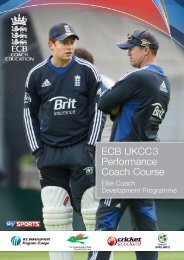


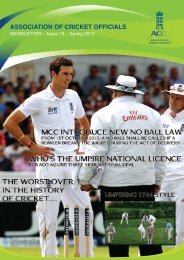
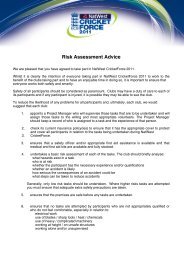
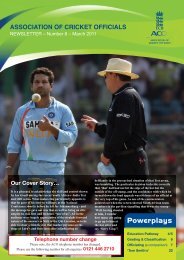
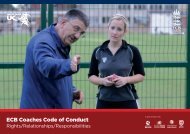

![Indoor Sports Halls with Cricket Provision [TS3] - Ecb - England and ...](https://img.yumpu.com/49070696/1/190x135/indoor-sports-halls-with-cricket-provision-ts3-ecb-england-and-.jpg?quality=85)
